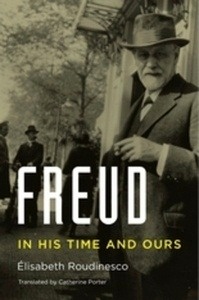Freud
In His Time and Ours

Editorial Harvard University Press
Fecha de edición noviembre 2016 · Edición nº 1
Idioma inglés
EAN 9780674659568
530 páginas
Libro
encuadernado en tapa dura
Resumen del libro
Élisabeth Roudinesco offers a bold and modern reinterpretation of the iconic founder of psychoanalysis. Based on new archival sources, this is Freud's biography for the twenty-first century a critical appraisal, at once sympathetic and impartial, of a genius greatly admired and yet greatly misunderstood in his own time and in ours.
Roudinesco traces Freud's life from his upbringing as the eldest of eight siblings in a prosperous Jewish-Austrian household to his final days in London, a refugee of the Nazis' annexation of his homeland. She recreates the milieu of fin de siècle Vienna in the waning days of the Habsburg Empire an era of extraordinary artistic innovation, given luster by such luminaries as Gustav Klimt, Stefan Zweig, and Gustav Mahler. In the midst of it all, at the modest residence of Berggasse 19, Freud pursued his clinical investigation of nervous disorders, blazing a path into the unplumbed recesses of human consciousness and desire.
Yet this revolutionary who was overthrowing cherished notions of human rationality and sexuality was, in his politics and personal habits, in many ways conservative, Roudinesco shows. In his chauvinistic attitudes toward women, and in his stubborn refusal to acknowledge the growing threat of Hitler until it was nearly too late, even the analytically-minded Freud had his blind spots. Alert to his intellectual complexity the numerous tensions in his character and thought that remained unresolved Roudinesco ultimately views Freud less as a scientific thinker than as the master interpreter of civilization and culture.
Biografía del autor
x{0026}lt;p x{0026}lt;strong Élisabeth Roudinescox{0026}lt;/strong (1944) recibió su formación psicoanalítica en la École Freudienne de París; es vicepresidenta de la Sociedad Internacional de Historia de la Psiquiatría y el Psicoanálisis y di rectora de investigaciones en la Universidad de París VII. Autora de numerosas obras de arte sobre literatura, cine, política, psicoanálisis e historia de las ideas, Roudinesco se dedica a la historia del freudismo y su relación con tres autores principales: Andersson, Ellenberger y Foucault. El público de habla castellana la ha consagrado por sus dos volúmenes de x{0026}lt;em Batalla de los cien años. Historia del psicoanálisis en Franciax{0026}lt;/em . En su último libro, publicado en Francia en 1994, x{0026}lt;em Généalogiesx{0026}lt;/em , propone una cronología del freudismo desde el 6 de mayo de 1856, fecha del nacimiento de Sigmund Freud, hasta nuestros días.x{0026}lt;/p








